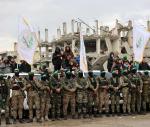You are here
Security Council, General Assembly never held Israel accountable for violations of UN principles
Jul 01,2020 - Last updated at Jul 01,2020
Seventy-five years ago, 50 countries signed the UN Charter at a conference in San Francisco in ceremonies attended by 3,500 delegates and 2,500 media representatives and observers from non-governmental organisations. Representing 80 per cent of the world's population, the signatories vowed to set up an organisation which would preserve peace and promote equality, the rule of international law, and social justice and freedom. The Charter entered into force on October 24 of that year.
There is little doubt that some countries emerging from the death and devastation of World War II at least temporarily meant to commit to these principles. But, commitments did not for long stand the test of time. The four permanent members, the US, UK, France and Russia, had interests which assumed paramountcy over principles and conflicted with the Charter.
Palestine is, of course, the most dramatic case. Western actions have consistently violated the UN Charter and international law. Despite the intervention of five Arab countries, Palestine was denied independence because of the determination of Britain, the US and France to partition it between the two-thirds Palestinian Arab indigenous population and the one-third Jewish colonists.
After Britain declared its intention of ending its rule of Palestine, pressure politics brought the issue before the UN General Assembly in November 1947 after months of investigations and wrangling. A straw vote conducted on the 22nd revealed that 24 countries supported partition, 16 opposed and the rest abstained or were undecided. This vote fell short of the two-thirds needed to adopt the proposed partition resolution. On the 26th, when a second vote was taken in committee the result was 25 in favour to 13 against.
Instead of proceeding with a vote in plenary, under pressure from the Zionist lobby, Washington proposed a recess for the US Thanksgiving holiday on the 27th. The Zionists and their US allies went all out to exert their influence direct and indirect via Washington on the anti-partition governments of Haiti, Liberia, the Philippines, China, Ethiopia and Greece to vote for partition or abstain. All but Greece capitulated and the partition resolution was adopted on the 29th by 33 votes in favour, 13 opposed and 10 abstentions. The resolution, ineluctably, led to war and the conquest by the well armed, well prepared Zionist underground army of 78 per cent, 23 per cent more than the 55 per cent allocated in the partition plan, and the expulsion of 750,000 Palestinians from their homes. To make it certain that they would not return their towns and villages were bulldozed.
Resolution 194, adopted by the Assembly on December 11, 1948, towards the end of the war and after the assassination of UN mediator Count Folke Bernadotte by Israeli extremists, attempted to restore Palestinian rights. It resolved that "refugees wishing to return to their homes and live in peace with their neighbours should be permitted to do so at the earliest practicable date, and that compensation should be paid for the property of those choosing not to return and for loss of or damage to property which, under principles of international law or equity, should be made good by the Governments or authorities responsible". Of course this was never implemented and the failure to carry through remains a large black blot on the record of the UN. This demonstrates the organisation’s inability to hold accountable powerful governments which protect Israel no matter what it does.
It must be pointed out that General Assembly resolutions are recommendations only and do not pack the punch of Security Council resolutions which are meant to be mandatory. Of course, the partition resolution was taken seriously while the resolution designed to regain Palestinian rights was not.
In November 1967, the Security Council unanimously adopted resolution 242 which called for withdrawal of Israel from "territories" occupied in the June war in exchange for peace. Thanks to pressure from the US, a major ambiguity was introduced into the text. Instead of "the territories" (as in the French version), which would have meant the whole lot, the resolution referred only to "territories", leaving room for Israel to claim and keep conquered land. This contradicted the preamble to the resolution, which referred to the principle of the “inadmissibility of the acquisition of territory by war".
The resolution also put forward the "land for peace" formula which has dominated Arab/Palestinian negotiations since 1967 and secured Egypt's demand for the return of all its territory occupied by Israel as the price of a peace treaty. After Palestinians and Israelis signed the 1993 Oslo Accord, Jordan also signed a peace deal with Israel in the expectation that a Palestinian state would emerge at the turn of the century. This did not take place because Israel illegally had colonised the Palestinian occupied territories with the aim of scuppering "land for peace" basis of a settlement. Although in flagrant breach of not only 242 and international law and the Fourth Geneva Convention, which prohibit settling Israeli citizens in conquered territory, the Security Council did not call upon Israel to "cease-and-desist" and impose sanctions to punish Israel for refusing to halt colonisation. Instead, the UN and its members, knowing full well what Israel was doing, simply stuck to "land for peace" as an empty slogan.
On December 23, 2016, the Security Council plucked up courage to adopt by 14 votes with, for the first time the US abstaining, a resolution reaffirming that Israel's colonies in occupied Palestinian territory, including in Jerusalem, had no legal validity and constituted a flagrant violation under international law. The Council pledged not to recognise changes in the June 1967 ceasefire lines unless negotiated by the sides. This resolution was, unfortunately, adopted after Israel's best friend ever, Donald Trump, was elected to occupy the White House. He scrapped all the shelved resolutions adopted with good intentions but without the will to challenge Israel by forcing Israel to implement them.
Over the past week UN Secretary General Antonio Guterres, UN Human Rights Commissioner Michelle Batchelet, and other UN officials have condemned as illegal Israel’s plan to annex some or all of Israel’s West Bank colonies and/or the Jordan Valley. Israel already has the blessing of the Trump administration for this project and does not care what the US or other government s say or do. Why should it? The Security Council and General Assembly have never held Israel accountable for its flagrant violations of the principles on which the UN was founded.













